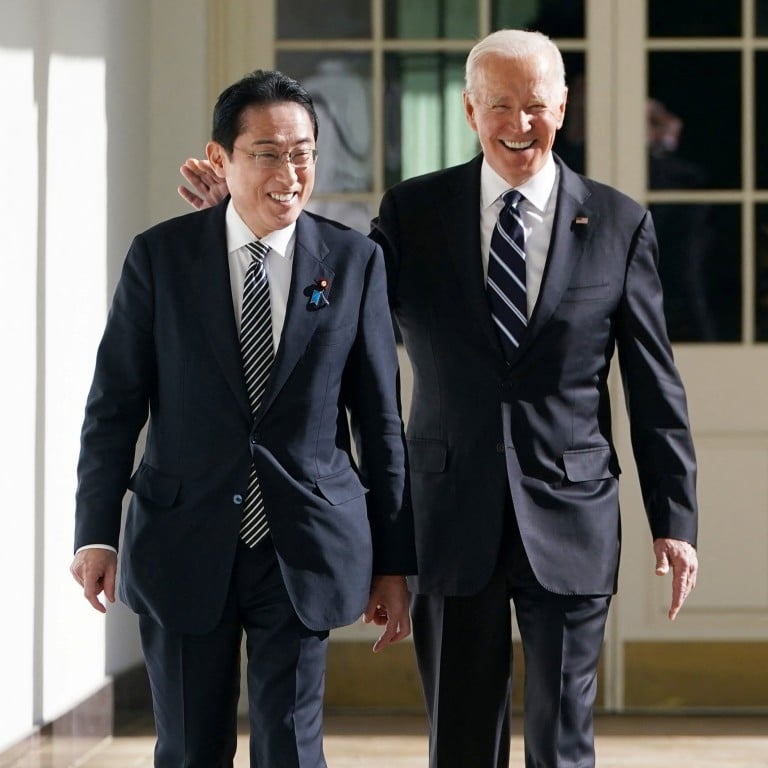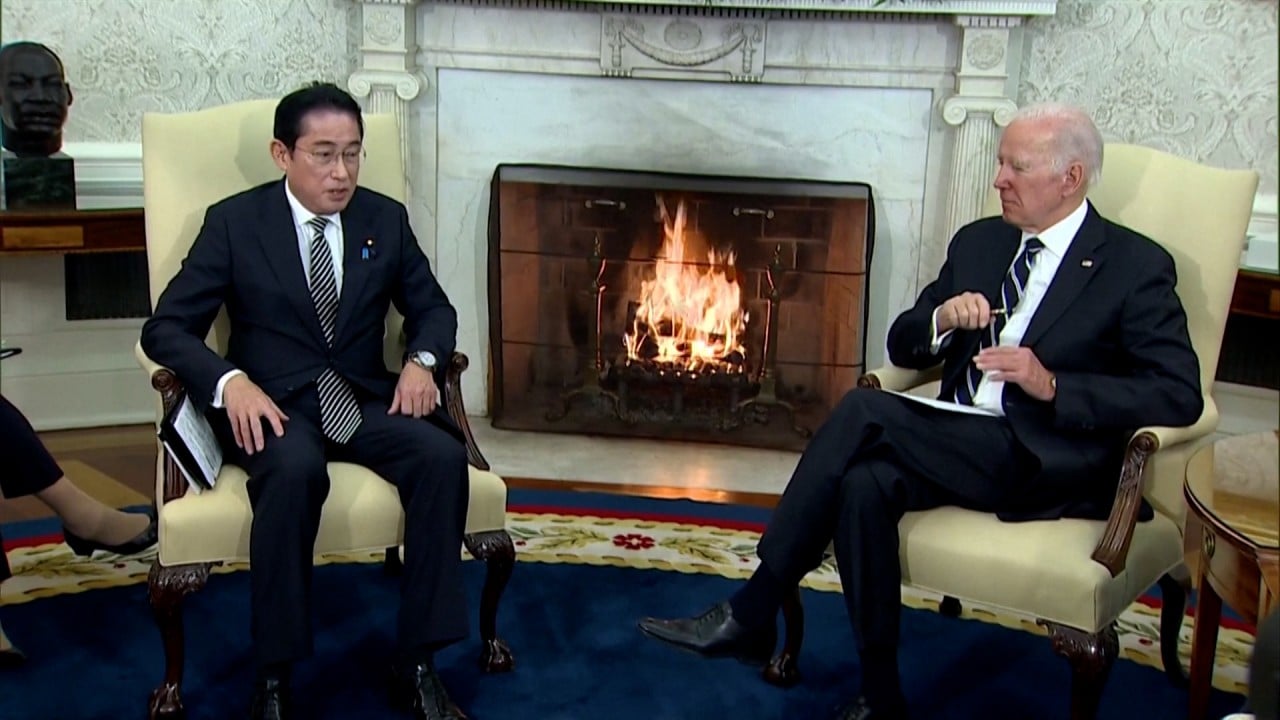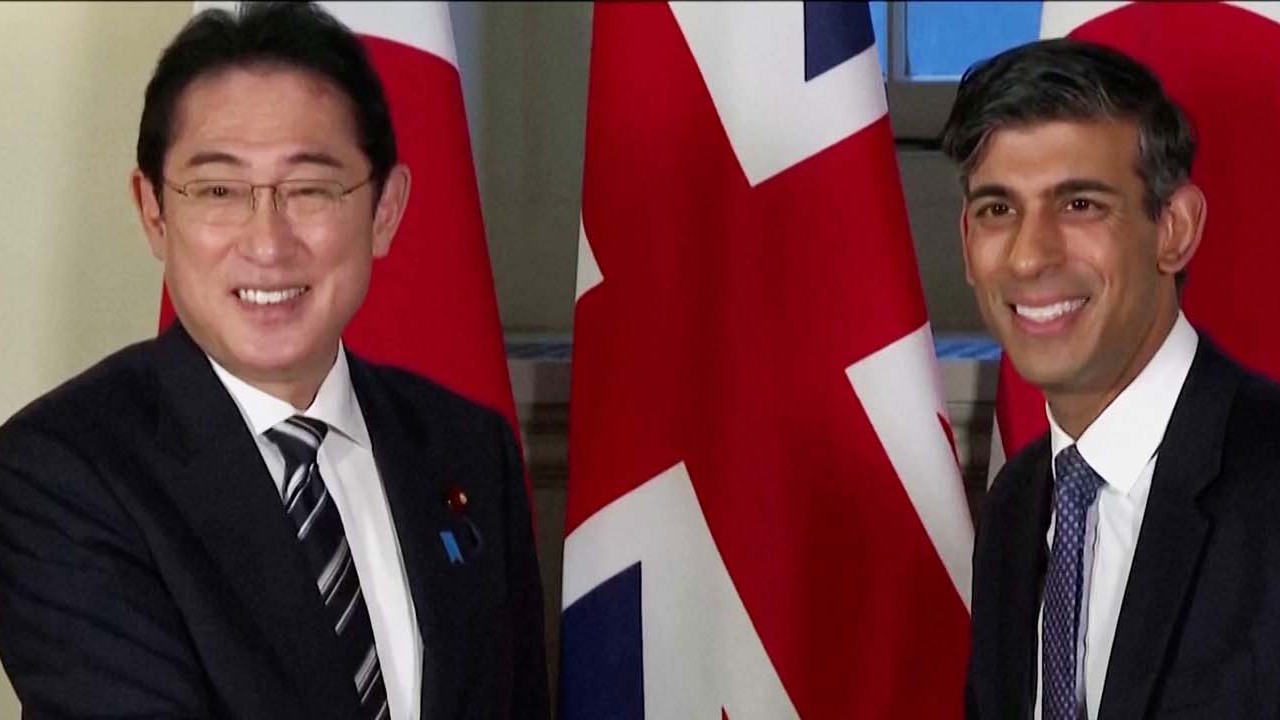
China’s concerns deepen as US and Japan hail ‘stronger than ever alliance’
- Japanese Prime Minister Fumio Kishida’s recent visit to Washington may leave Beijing feeling more isolated, diplomatic analysts say
- Tokyo’s pledge to increase defence spending and increasingly vocal stance on Taiwan have already prompted sharp criticism from Beijing
Japan calls on UN to ‘unite’ around rule of law in veiled dig at China
On Friday Joe Biden welcomed the Japanese Prime Minister Fumio Kishida to Washington, where the two signed a pact to deepen security and space cooperation.
The US President hailed Japan’s “historic” decision to nearly double its defence budget over the next five years and said Washington is “fully, thoroughly, completely” committed to the bilateral security alliance.
Highlighting concerns over China’s increased military pressure on Taiwan, the two said in a joint statement: “We emphasise that our basic positions on Taiwan remain unchanged.
“We encourage the peaceful resolution of cross-strait issues.”
Washington was Kishida’s last stop in his week-long tour of the Group of 7 industrial powers.
In a speech on Friday at the Johns Hopkins University School of Advanced International Studies, Kishida described China as “the most central challenge for both Japan and the US”.
He recalled his Bangkok meeting with President Xi Jinping in November and said it was up to China to decide if it would abide by the existing international rules.
He expressed a desire to “reach a common understanding with China on the state of the international order” and urged Beijing to act responsibly and continue dialogue on “issues of concern and cooperate on matters of common interest”.
Kishida also dismissed concerns about Japan’s biggest military build-up since World War II and claimed it as “one of the most historically critical milestones for strengthening the alliance” with the US and other like-minded countries.
Beijing has yet to comment on the Biden-Kishida summit. But on Friday, Chinese foreign ministry spokesman Wang Wenbin, denounced a joint US-Japan statement from foreign and defence officials as “full of groundless smears against China”.
“While claiming to promote regional peace and stability, the US and Japan are in fact finding a pretext for their military build-up,” Wang told a regular news briefing Friday in Beijing.
The tabloid Global Times, which is owned by the party mouthpiece People’s Daily, published its second editorial in a week on Saturday, lashing out at Kishida’s efforts to seek “foreign support”.
US, Japan vow stronger security ties to counter China’s rapid growth
“Japan’s strategic impulse and Washington’s selfish strategy toward China are birds of a feather, posing unprecedented risks to the Asia-Pacific region and the international community after World War II,” it said.
Taiwan was also high on Kishida’s agenda when he visited France, Italy, Britain and Canada to bolster security ties – with observers saying this was in part aimed at boosting his approval back home.
Benoit Hardy-Chartrand, an international affairs specialist at Temple University Japan in Tokyo, said the depth of the commitment Biden and Kishida had shown to their alliance was “striking”.
Japan to expand island military base near Taiwan after China’s missile drills
While the latest developments, including Japan’s plans to bolster its military capabilities, may not signal an immediate shift in the regional order, “it points to an increasingly tense security environment where each side’s position is further crystallised,” he said.
Hardy-Chartrand added: “While Tokyo’s plan to reinforce its military does not necessarily contradict its stated desire to stabilise relations with China, there’s no doubt that it fuels suspicions in Beijing and complicates efforts towards rapprochement,” he said.
Despite Beijing’s recent efforts to reset its ties with the West, he said it would be difficult for Beijing to “avoid a degree of isolation from the West”, given the widespread concern in the West that China is trying to reshape the international order.
Li Mingjiang, an associate professor at Nanyang Technological University’s S Rajaratnam School of International Studies in Singapore, said Japan’s China policy has undergone “qualitative changes”.
He noted Japan has become increasingly active in shaping the Indo-Pacific security landscape and said Japan’s increasingly vocal stance on Taiwan was particularly worrying for Beijing, which regards the island as a breakaway province that must be reunited with the mainland, by force if necessary.
“Japan views the Taiwan issue differently from many other countries, as it has historical connections with the island, which it believes is linked to its own national security,” Li said.
But Gal Luft, co-director of the Washington-based Institute for the Analysis of Global Security, said Japan’s rearmament plan may take years to materialise and could face problems over funding and domestic opposition.
How will visa rows affect China’s ties with Japan and South Korea?
“This means that while in the long run Japan could turn into a military game changer, in the foreseeable future the military balance is not going to change much,” he said.
“That said, the tightening US-Japan alliance will feed China’s sense of encirclement, causing Beijing to intensify its military modernisation and to deepen its relations with Russia. This will in turn feed a regional arms race which would become a major economic liability for all parties involved.”



